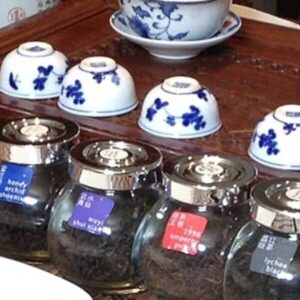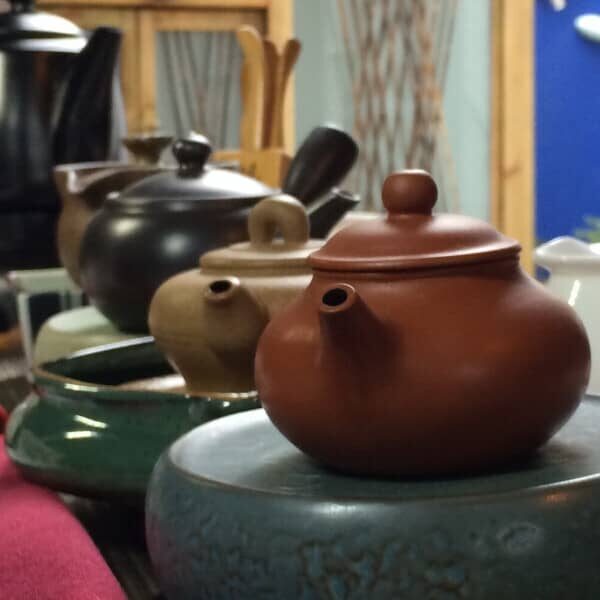Refreshing You From Shoulders Up
Green Teas
All tea starts off as green.
Green tea stays green because its leaves are shielded from oxidation during its crafting, with the result that the chemical composition of the dry leaves is very close to that of newly picked leaves which have been simply left to wilt naturally.
Chinese green teas are wok-fired, whilst Japanese green teas are steamed in a process called ‘fixing’. This is simply the application of heat to kill the naturally occuring enzymes in the leaf that would otherwise enable oxidation.
The liquor of green tea is clean, subtle, fresh and vibrant, and there is no better way to refresh and rejuvenate yourself during the day than to enjoy a cup of naturally sweet, antioxidant-rich green tea.
OUR GREEN TEAS

add to tea basket
This product has multiple variants. The options may be chosen on the product page
Gyokuro
£8.50 – £16.50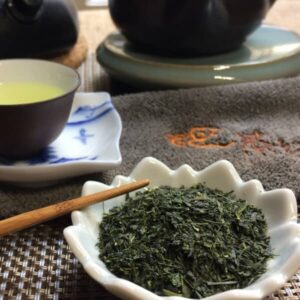
add to tea basket
This product has multiple variants. The options may be chosen on the product page
Sencha Miya
£8.00 – £15.50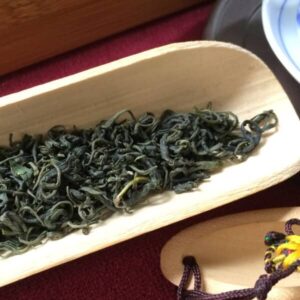
add to tea basket
This product has multiple variants. The options may be chosen on the product page
Mao Feng
£8.00 – £15.50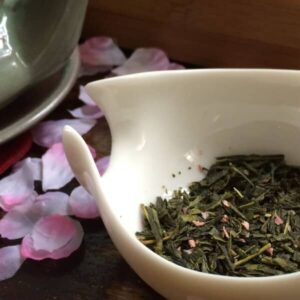
add to tea basket
This product has multiple variants. The options may be chosen on the product page
Sakura Sencha
£8.00 – £15.50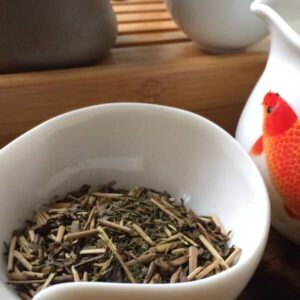
add to tea basket
This product has multiple variants. The options may be chosen on the product page
Houjicha
£8.00 – £15.50Sold out

out of stock
This product has multiple variants. The options may be chosen on the product page
Genmaicha
£8.00
add to tea basket
This product has multiple variants. The options may be chosen on the product page
Matcha
£8.00 – £15.50
Japanese green teas are renowned for their umami sweetness, suggestive of the ocean and refreshing spring greens. Along with an abundance of other fresh, clean and complex flavours, The sweetness of Japanese green teas is not “sugary” but subtle. This umami sweetness is really pronounced, especially on second and third tasting.
Umami sweetness is apparent at different intensities depending on the tea and is directly related to how the tea was cultivated and processed. Some higher grades Japanese Green teas (such as Gyokuro) undergo weeks of under-shade (open-air) cultivation, which inhibits astringent (bitter) tannin formation and promotes theanine, the amino acid which we experience as umami.
It is a testament to the extraordinary care applied in the making of Japanese green tea, to see huge screens of rice straw or synthetic netting erected to cover entire tea fields, then dismantled after two or three weeks to once again allow direct sunlight on to the young, vitamin-rich tea plants.
Steaming is the archetypal Japanese tea-manufacture process. It serves to fix the vivid, dark, emerald colour of the leaf and preserve the natural enzymes packed with flavour. Standard steaming last for less than a minute, while deep steaming imparts a deeper colour and stronger flavour.
OUR JAPANESE GREEN TEAS

add to tea basket
This product has multiple variants. The options may be chosen on the product page
Gyokuro
£8.50 – £16.50
add to tea basket
This product has multiple variants. The options may be chosen on the product page
Sencha Miya
£8.00 – £15.50
add to tea basket
This product has multiple variants. The options may be chosen on the product page
Sakura Sencha
£8.00 – £15.50
add to tea basket
This product has multiple variants. The options may be chosen on the product page
Houjicha
£8.00 – £15.50Sold out

out of stock
This product has multiple variants. The options may be chosen on the product page
Genmaicha
£8.00
add to tea basket
This product has multiple variants. The options may be chosen on the product page
Matcha
£8.00 – £15.50
With flavours ranging from sweet to creamy, toasty or nutty, the finest Chinese green teas come from the country’s eastern and south-eastern regions, and the most prized are those harvested in early spring.
The lighter, sweeter and smoother the green tea, the higher the grade. The finishing method contributes to the tea’s unique appearance, aroma, and taste.
Each region possesses its own traditional styles of tea making, though even within a region there are variations between villages and producers.
OUR CHINESE GREEN TEA

add to tea basket
This product has multiple variants. The options may be chosen on the product page
Mao Feng
£8.00 – £15.50
Take part in the beautiful Chinese ‘gongfu cha’ tea ceremony while we shares with you our love of tea. You’ll discover how to appreciate the finer nuances of tea like a true connoisseur, yet in a light and relaxed setting.
You’ll be introduced to gorgeous teas with fascinating, evocative names like ‘snow buds’, ‘honey orchid phoenix’ and ‘dragon well’. The incredible range of flavours and aromas will amaze you.
~~ Whilst we patiently wait for the effective control of COVID-19 pandemic, our popular tea masterclasses are held online via our “Teas in the Clouds - Brew-along Masterclass”. ~~
OUR TEA MASTERCLASSES
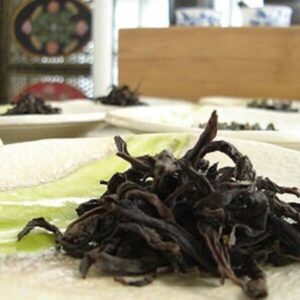
add to tea basket
This product has multiple variants. The options may be chosen on the product page
‘Flight of Tasting’ Event
£25.00Tea Artisan Training Course
£180.00Oxygen. Wonderful stuff.
But it also oxidises things: think iron rusting or copper coins going that weird green colour and the cut side of apple turning brown. Fresh tea leaves, like apples and other plants, have an enzyme called polyphenol oxidase. It is capable of oxidizing polyphenols which are very important molecules for protection against infections to giving them their pigments.
Polyphenol oxydase and the polyphenols themselves are stored in the plant’s cells, but when the cells are damaged, say by slicing an apple or dropping and bruising it, the cells are ruptured and the enzyme comes into contact with air. With the help of oxygen in the air, the polyphenol oxidase initiates a series of chemical reactions, transforming the polyphenols and eventually producing melanins (brown pigments).
The general name for this process is “enzymatic browning,” and the fabulous thing (for tea at least) is that it doesn’t just change the appearance of produce: it also alters flavour, scent, and nutritional value.
LET’S GO PICK SOME TEAS





